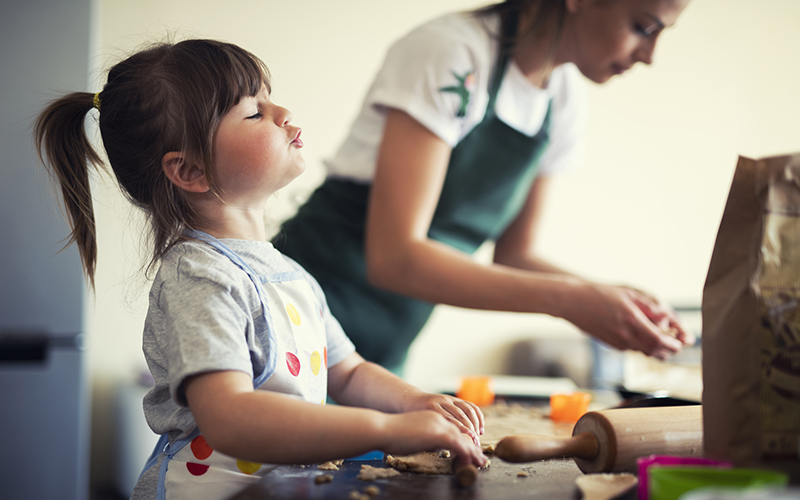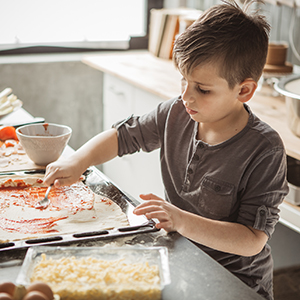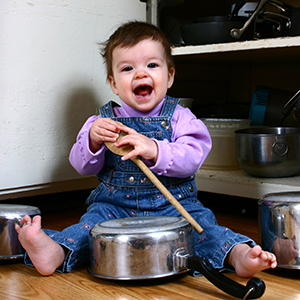Cooking with Your Kids

Part of our Raising Resilient Kids series
Is your attention often torn between cooking a healthy meal and entertaining your kiddos? Juggling parenting and cooking can be downright exhausting – or end up in a bit more screen time than you like. So what gives when you’re committed to preparing a nutritious, home-cooked meal?
One of the best ways to strike a balance and engage kids while cooking is to involve them in some meal-prep activities. Including your kids in the cooking process can help teach valuable lessons, encourage their interest in the meal you’re about to eat, and help you feel less stressed when it’s time to sit down to dinner.
The Benefits of Cooking With Your Kids

Cooking is an opportunity to connect. You might find that children are much more willing to open up about their day while engaged in an activity. Try it and see!
Cooking teaches kids healthy habits. Encouraging kids help out in the kitchen is a perfect way to talk about nourishing foods and ingrain healthy habits.
Cooking can sharpen kids’ basic skills. Cooking is a great real-world opportunity to practice math skills (think measuring ingredients, helping double or halve recipes, etc.) as well as reading skills. There are endless opportunities to apply the concepts kids are learning during the school day.
Age-Appropriate Activities for Kids in the Kitchen
Wondering how to put your toddler to work? Believe it or not, there are many ways to keep kids of all ages engaged in the kitchen. Here are some developmentally appropriate activities by age group:

Baby – Simply move baby into a safe area of the kitchen so he/she can watch you and smell the foods cooking. This offers a wonderful sensory experience, even at the youngest of ages.
1-2 years – Allow your toddler to play with pots and pans on the floor or explore the lower cupboards, provided the items inside are safe. They might enjoy pulling towels out of a bin and practicing putting them back or learning to sir with a bowl and a wooden spoon.
2-3 years – They might enjoy more structured and supervised activities such as tearing greens into pieces, pouring ingredients into a bowl, rinsing fruits and vegetables, or stirring ingredients.
4-6 years – By four years of age, most kids can mash potatoes, practice counting skills by gathering ingredients for a recipe, assemble pizzas, sandwiches or salads, peel boiled eggs, scoop, measure, and wipe down surfaces or clear the table.
6 years+ – Kids six years old and up with experience in the kitchen may be able to handle more advanced tasks, such as reading and helping to complete recipes, wash and peel vegetables, and practice with other kitchen equipment.
Note: While your child is helping in the kitchen, always be mindful of safety, keeping sharp knives out of reach, steering clear from the stove and oven, and making sure he/she is properly situated in a high chair or learning tower to avoid falls.
Remember, at the earliest of ages, kids might not be as helpful, and their “assistance” might result in some small messes for you to clean up. However, the more time your little sous chef spends practicing and helping in the kitchen, the more proficient – and helpful – he/she will become. Another great bonus? Cooking and learning about nourishing foods can also help build resiliency in kids.
Bon Appétit!
Need some fast meal-prep methods? Download these Cooking Methods that Make Quick Dinners a Breeze
Help with Food Resources
If you’re struggling to afford healthy foods to prepare for your family, Michigan 2-1-1 can connect you to the things you need. By dialing 2-1-1, you can get help accessing resources you need—whether it’s the number to a local food pantry or information on how to enroll for supplemental food support.
Need more assistance? Visit Community Connections for information about additional resources.